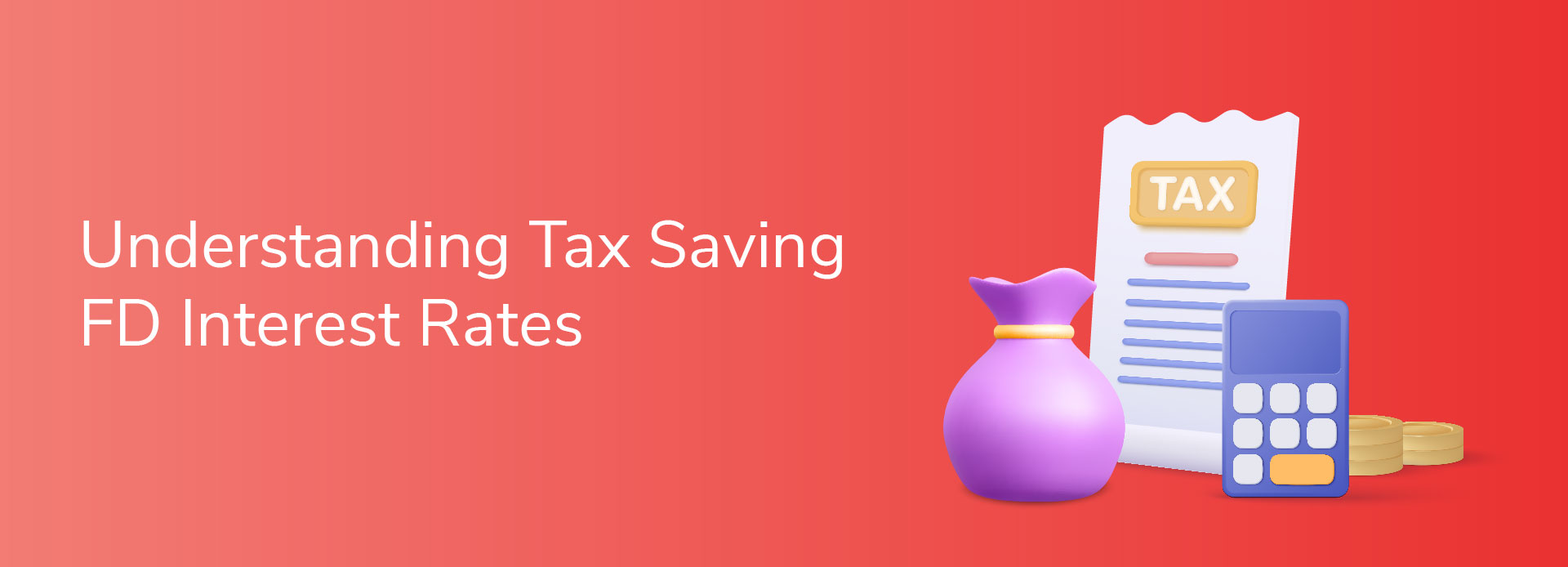
Understanding Tax-Saving FD Interest Rates: A Comprehensive Guide
23 July 2024 | By INDIE
Tax-saving Fixed Deposits (FDs) offer a safe and guaranteed avenue for risk-averse investors to save tax under section 80C of the Income Tax Act, 1961. These FDs come with a mandatory lock-in period of five years and offer interest rates ranging from 5.5% to 7.75% across banks. The interest earned is taxable and added to your income. To maximise returns on these deposits, it is important to compare interest rates across banks and opt for higher tenures.
How do tax saving FDs work?
You can claim a tax deduction for the amount of money you invest in tax-saving FDs in a financial year up to the limit of ₹1.5 lakh. The interest earned on these FDs is taxable as per your income tax slab.
When opening a tax-saving FD, investors need to submit identity proof and address proof documents like Aadhaar, PAN card, driving license, etc. The tax benefit is available only to the first account holder in the case of joint accounts. Premature withdrawals are not allowed before five years except in case of the death of the depositor.
Interest rates offered on tax-saving FDs
Tax saving fixed deposit offers fixed interest rates that are determined at the time of investment. The interest rates on tax-saving FDs are usually higher than regular term deposits as they come with a mandatory lock-in period of five years.
Banks tend to offer attractive interest rates on these deposits to attract customers looking to save tax. When deciding where to invest in a fixed deposit tax-saving scheme, it is wise to compare interest rates and opt for the bank offering the fixed deposit with highest interest rate.
The interest rate on tax-saving FDs differs depending on the bank. For instance, INDIE by IndusInd Bank offers tax-saving and other types of FDs with attractive interest rates of up to 7.75%. You can book and manage your INDIE FDs completely online and give your money a boost. Download the INDIE app today!
Senior citizens can avail anywhere between 0.25% to 0.5% higher interest rates than the standard rates offered. The interest rate applicable remains fixed for the entire tenure of five years in a tax-saving FD. Banks cannot reduce the rate once the deposit has been booked.
Maximising returns on tax-saving FDs
To maximise returns on tax-saving fixed deposits, follow the tips listed below.
● Choose the cumulative interest option where interest reinvests to compound returns. However, this delays your cash flow.
● Senior citizens get 0.25% to 0.5% higher rates. If you are over 60, open the FD in the senior citizen category.
● Online/paperless accounts often offer slightly higher rates than physical branches. Consider the account opening method.
● Time your investment near the end of the financial year to utilise the 80C limit fully. But don't compromise on rates for this.
● Use online FD calculators to forecast maturity value and interest earnings. This helps optimise the investment amount.
● Avoid premature withdrawals and delays in renewal as it leads to penalty loss of interest.
● Split large investments across banks to diversify and maximise yield through differential rates.
Things to consider before opening a tax-saving FD
There are five major things to consider before opening a tax-saving FD.
● Lock-in period: Tax-saving FDs have a lock-in of five years. Ensure your investment horizon aligns.
● Premature withdrawal: Premature withdrawals are not allowed. Have an emergency fund in place for liquidity needs.
● Interest income: Interest earned is taxable. Account for this in tax planning.
● Compare interest rates: Shop around to get the best interest rate on your investment.
● Investment limit: You can claim tax benefits only up to ₹1.5 lakh invested under section 80C.
Conclusion
Fixed deposits provide secure and assured returns for cautious savers aiming to reduce taxes under section 80C. However, it is important to compare interest rates, choose optimal tenures, and time investments right to maximise returns. With their tax benefits, capital protection, and fixed returns, tax-saving FDs can be an ideal investment option for conservative investors' portfolios.
Disclaimer: The information provided in this article is generic and for informational purposes only. It is not a substitute for specific advice in your circumstances. Hence, you are advised to consult your financial advisor before making any financial decision. IndusInd Bank Limited (IBL) does not influence the views of the author in any way. IBL and the author shall not be responsible for any direct/indirect loss or liability incurred by the reader for making any financial decisions based on the contents and information.





